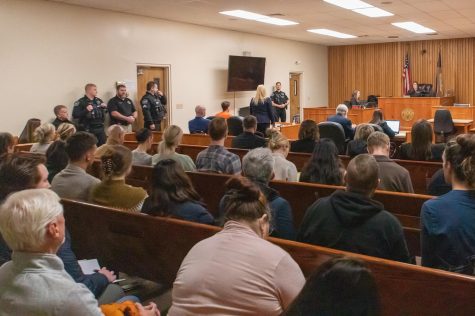University and community offer resources
April 29, 2015
For an individual who has experienced a traumatic occurrence, the take-back of power starts with deciding where to turn for support. Some resources are confidential, and others are required to disclose information to superiors. All offer different types of support for victims.
Confidential Resources
Medical Services
All health services are, by default of legal privacy policy (Health Insurance Portability Accountability Act), confidential for anyone over 18. Assault survivors, including victims of sexual assault and forms of dating violence, may reach out to the following confidential resources for their practical and pertinent health concerns. Health professionals at these facilities are available to discuss individual circumstances, concerns and options.
Some services one might receive care for could include, but are not limited to, date rape drug testing, STI testing, and/or a forensic examination (colloquially called a rape kit), which will collect forensic evidence after an assault. Health professionals are more than willing to give advice on what victims may need and what the process of each procedure involves.
Health & Wellness Services
Main Line: (509) 335-3575
Located on campus in the Washington Building, Health & Wellness Services offers a wide variety of services to sexual assault victims. With 5 SANE (sexual assault nurse examiner) trained registered nurses, Health & Wellness is fully equipped and prepared to address physical and emotional trauma caused by an assault.
At Health & Wellness, students may complete a forensic evidence collection kit and be directed to other departments such as Counseling and Testing Services to ensure that victims receive all the care they need and want.
Students also have the option to consult with an advocate from Alternatives to Violence of the Palouse (ATVP) during their visit. The representative can be there, if the student wishes, for support and/or to explain the clinical process of their visit.
Pullman Regional Hospital
Main Line: (509) 332-2541
Pullman Regional Hospital is an off-campus healthcare resource that is well-equipped with anything assault survivors may need to pursue health care related to their trauma. The hospital’s emergency department offers quick care and is staffed 24/7 by a nursing staff trained in forensic nursing to provide victims of sexual assault with counseling and exams.
Counseling Services
WSU Counseling and Testing Services
Lighty 280 Main Line: (509) 335-4511 After Hours: (509) 335-2159
Walk-in Hours: Mondays from 1 – 3:30 p.m., Tuesday – Friday from 10 – 11:30 a.m. and 1 – 3:30 p.m.
If students have an urgent need and require immediate attention, WSU Counseling and Testing Services is available to accommodate and meet with that student.
Students in urgent need of support are invited to come into the office any time Monday through Friday between 8 a.m. and 5 p.m. For after-hours and weekend assistance, students may call the after-hours phone number.
If a student is able and willing to go through the non-immediate process of establishing counseling care, they can come to the office during walk-in hours. Students will still be seen quickly, even if their need is not urgent. During their first visit, students should allow approximately 15 minutes to fill out paperwork and 20 – 50 minutes for their initial counseling visit.
Alternatives to Violence of the Palouse (ATVP)
Main Line: (509) 332-HELP (4357) 24-Hour Crisis Hotline: 1-877-334-2887
Alternatives to Violence of the Palouse (ATVP) is an off-campus, confidential resource for victims of sexual assault. ATVP is a privately-owned, nonprofit organization. Services are provided free of charge for Whitman and Latah county residents, and include a 24-hour telephone hotline, 24-hour in-person crisis intervention, emergency shelter, legal and medical advocacy, individual and group support, and information and referral.
ATVP works closely with university resources and can accompany students to Health & Wellness and Pullman Regional Hospital for their medical treatment after an assault. ATVP representatives can also give students thorough information about their options and rights over the phone.
Non-Confidential Resources
Non-confidential does not mean students are forced to pursue legal justice or student conduct hearings. Survivors may opt out of any investigation or procedure at any time. Survivors may also decide to go back and pursue legal prosecution and/or university procedures after they have decided to opt out.
Non-confidential refers to these resources’ obligation to report instances of assault to various authorities and to pursue, if necessary, an investigation and/or student conduct trial, depending on the resource, based on the information they receive regardless of the student’s desire to be involved with the proceedings.
University Resources
University resources can be helpful and vastly supportive for students who want to pursue avenues of assistance after an assault. Since sexual assault, sexual harassment, dating violence, and stalking are all forms of gender-based violence that violate student conduct regulations, the following resources are required to report any information they have regarding student misconduct to higher authority.
Residence Life
Students living in residence halls can reach out to their Resident Adviser (RA) for support and information. RAs are required to report situations of misconduct to their superiors, so although RAs undergo extensive training for support and are available for students to talk to regarding trauma and assault, they are not a confidential resource.
WSU Employees
Like RAs, WSU employees can be supportive resources for students who have experienced a trauma, but are not confidential. Employees are required, if they have information regarding a sexual assault or sexual misconduct, to report the incident to the Office for Equal Opportunity or to one of the designated Title IX Co-Coordinators or Title IX Liaisons.
Office for Equal Opportunity (OEO)
Main Line: 509-335-8288 French Administration Building, Room 225
To File a Complaint: http://oeo.wsu.edu/file-a-complaint/
When students report sexual assault (or any gender-based violence or misconduct, such as dating violence or stalking) to the Office for Equal Opportunity (OEO), the OEO can start an investigation, provide the student with safety options, and connect the student to local support, such as medical and counseling resources.
Reporting an instance of sexual assault to the OEO is not the same process as reporting to the police. Legal and Student Conduct procedures are different avenues of reporting assault, but both avenues can be pursued simultaneously. At any point, students may change their mind about pursuing an investigation and opt out of all further proceedings. However, the OEO will still pursue the investigation (but leave the opting-out party anonymous and uninvolved from that point onward) based on student misconduct.
Legal Resources
For survivors who wish to pursue legal action following an assault, the WSU Police Department and Pullman Police Department are resources that will conduct a formal investigation and file an official police report.
Success of legal prosecution is improved when a forensic evidence collection kit is completed at Health & Wellness Services, Pullman Regional Hospital, or any community health clinic. Legal resources are not confidential, but survivors may choose to discontinue an investigation at any point.
WSU Police
Main Line: (509) 335-8548
The WSU Police Department has jurisdiction over reports of assaults that occur on campus, such as in a residence hall. If called, WSU Police can investigate and gather evidence from a crime scene, if there is one, transport the complainant to a health service to receive care, file a report, and begin a formal investigation.
Pullman Police
24-Hour Main Line: (509) 334-0802
The Pullman Police Department has jurisdiction of reports of assaults that occur off-campus, such as on Greek Row or apartment land. If called, the Pullman Police can investigate and gather evidence from a crime scene, if there is one, transport the complainant to a health service to receive care, file a report, and begin a formal investigation.


















